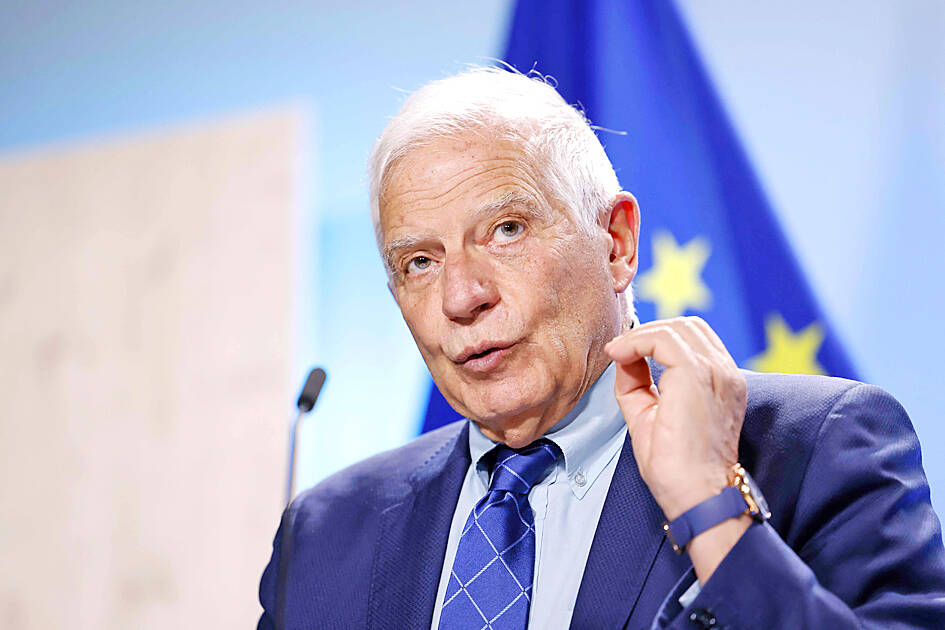The EU on Saturday offered closer political and investment ties to 20 countries from across the Indo-Pacific region, as the bloc seeks more influence despite growing Chinese and US ambitions.
At a forum that gathered foreign ministers from the EU and the Indo-Pacific, several speakers touted the Global Gateway program, Europe’s answer to China’s massive infrastructure project, the Belt and Road Initiative. The meeting on Saturday was itself a snub to Beijing, which was not invited.
“Our ambition is to work toward the preservation of the Indo-Pacific as a free, open, prosperous and inclusive region, and to build partnerships between equals,” French Minister of Europe and Foreign Affairs Catherine Colonna said in a speech.

Photo: AFP
The EU “refuses to enter a logic of blocs that would make escalation and, eventually, confrontation, inevitable,” she said.
After decades of viewing China primarily as a commercial opportunity, the EU is seeking to boost its footprint in the region and reduce its reliance on imports from the world’s second-biggest economy, including on raw materials critical for the bloc’s green transition.
The EU’s dependence on Beijing, whose leader, Chinese President Xi Jinping (習近平), has declared a “no limits” friendship with Russian President Vladimir Putin, was laid bare during the COVID-19 pandemic, when countries and companies scrambled to source masks and other equipment.
Russia’s invasion of Ukraine has heightened tensions with the West pressing Beijing to distance itself from Moscow.
The EU first adopted a common strategy on the Indo-Pacific in 2021 pushed by France, which has overseas territories in the area.
Ending Saturday’s forum, whose guests included India, Japan and Indonesia, EU High Representative for Foreign Affairs and Security Policy Josep Borrell said the bloc wants “to step up our engagement to deliver more concrete results on the ground.”
Borrell said the EU would pursue 20 Global Gateway projects in the Indo-Pacific “from investment in hydropower, solar energy plants to transportation infrastructure, railways, ports and airports.”
The EU late last year signed an agreement with Thailand to foster a bilateral dialog on energy, climate change and other issues.
While Colonna did not mention China, she said the Global Gateway strategy was meant to promote “lasting, quality infrastructure projects that don’t put countries in a situation of dependence,” including in the digital sector.
Colonna also said that French frigates would patrol more often in the region.
A French warship patrolled the Taiwan Strait last month, while China conducted military exercises in the area.
France did not invite US representatives last year, but Washington was represented on Saturday.
Paris deems the Indo-Pacific a priority. The region hosts about 1.6 million French citizens and France has a military presence in French overseas islands, including New Caledonia, Wallis-and-Futuna or Mayotte, and 8,000 soldiers.

ANGER: A video shared online showed residents in a neighborhood confronting the national security minister, attempting to drag her toward floodwaters Argentina’s port city of Bahia Blanca has been “destroyed” after being pummeled by a year’s worth of rain in a matter of hours, killing 13 and driving hundreds from their homes, authorities said on Saturday. Two young girls — reportedly aged four and one — were missing after possibly being swept away by floodwaters in the wake of Friday’s storm. The deluge left hospital rooms underwater, turned neighborhoods into islands and cut electricity to swaths of the city. Argentine Minister of National Security Patricia Bullrich said Bahia Blanca was “destroyed.” The death toll rose to 13 on Saturday, up from 10 on Friday, authorities

OPTIMISTIC: A Philippine Air Force spokeswoman said the military believed the crew were safe and were hopeful that they and the jet would be recovered A Philippine Air Force FA-50 jet and its two-person crew are missing after flying in support of ground forces fighting communist rebels in the southern Mindanao region, a military official said yesterday. Philippine Air Force spokeswoman Colonel Consuelo Castillo said the jet was flying “over land” on the way to its target area when it went missing during a “tactical night operation in support of our ground troops.” While she declined to provide mission specifics, Philippine Army spokesman Colonel Louie Dema-ala confirmed that the missing FA-50 was part of a squadron sent “to provide air support” to troops fighting communist rebels in

Two daughters of an Argentine mountaineer who died on an icy peak 40 years ago have retrieved his backpack from the spot — finding camera film inside that allowed them a glimpse of some of his final experiences. Guillermo Vieiro was 44 when he died in 1985 — as did his climbing partner — while descending Argentina’s Tupungato lava dome, one of the highest peaks in the Americas. Last year, his backpack was spotted on a slope by mountaineer Gabriela Cavallaro, who examined it and contacted Vieiro’s daughters Guadalupe, 40, and Azul, 44. Last month, the three set out with four other guides

Local officials from Russia’s ruling party have caused controversy by presenting mothers of soldiers killed in Ukraine with gifts of meat grinders, an appliance widely used to describe Russia’s brutal tactics on the front line. The United Russia party in the northern Murmansk region posted photographs on social media showing officials smiling as they visited bereaved mothers with gifts of flowers and boxed meat grinders for International Women’s Day on Saturday, which is widely celebrated in Russia. The post included a message thanking the “dear moms” for their “strength of spirit and the love you put into bringing up your sons.” It